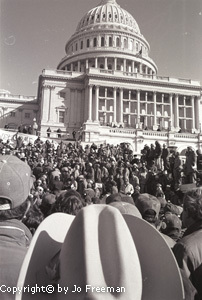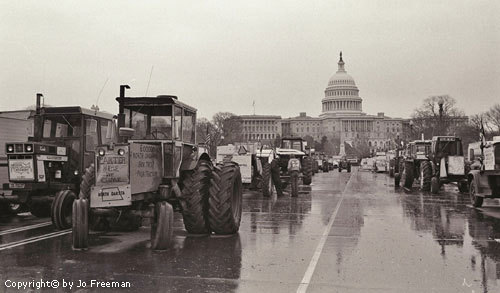Recently, I attended a reunion of old friends in Lubbock, Texas. The two day event was an emotional time for those of us who had not seen our brothers and sisters for many years. Sadly, the reunion came too late for some. Their names were read aloud from the podium. We nodded and smiled when they were remembered. Some of us wiped a tear.
We were young and naive when we banded together in September of 1977. Our youthful naivety fueled our determination to change the world and nothing was going to stop us.
The experiences that followed were life-altering. We received an invaluable education in grassroots organizing that spawned unexpected new careers. Our activism took us in many different directions but it was the catalyst that bonded us together for life.
In the years that followed, some of us became company presidents, others became Washington lobbyists, foundation executives, celebrated authors, equipment manufacturers, inventors, state and federal agency administrators and even broadcasters. Our group also produced its share of politicians of almost every rank, from county and state elected officials to the Governor of a state. One of the fellows we successfully supported for Congress is now the chancellor of a major university.
Our recent reunion was different than any of our previous gatherings. This time, we attracted historians and camera crews. They asked us endless questions and recorded our answers for a museum and for a documentary series.
The first speaker at the reunion was "Larry." Larry is currently the administrator of a federal agency and his attendance was so controversial that his speech had to be vetted by an undersecretary.
Larry spoke emotionally about our accomplishments and the personal price we paid for our political activism. He also helped us ratify the value of our efforts and he encouraged us to embrace our experiences and to accept the way the movement changed us, even though it changed the way we were "appraised" by our families and by those who disagreed with our tactics. It was a reminder that our lives would have been very different if we had not been involved in the movement.
Larry reminded us that the movement opened our eyes to the world and that's a good thing.
While I emphasize the need for political activism by each successive generation. I don't recommend it to any particular individual. Political movements can change the course of our lives and permanently scar our families and our community relationships. Even though grassroots protests are essential to the evolution of our republic, they can be terribly deleterious to those involved. So I share this story about the American Agriculture Movement with guarded enthusiasm. Most older Americans remember the AAM-led farm strike and the tractorcades of the late 1970s as a traffic snarling inconvenience and little else.
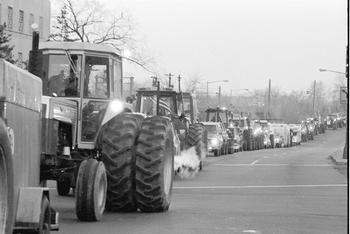
We never apologized for creating these inconveniences because we understood that if government policies destroyed our farms, agriculture would fall under the control of a few major corporations and all Americans would pay the price in terms of higher food costs. In that way, we were protesting for consumers too. It was an honorable calling and we answered the call with determination. Although history has shown our cause to be just, we were marginalized at the time by the national media and by the government we petitioned for redress. Twas ever thus...
We viewed ourselves as the "Gentle Rebels" of our day. We were the young men and women from the America's Heartland who left our communities and drove our tractors and trucks to state capitols and on to Washington D.C., in order to make our collective voices heard. Our voices were amplified by the 15,000 pound tractors we used to block the streets and highways. Our tractors were symbols of our collective strength that helped us stand toe-to-toe against the power of a non-responsive government. Today, our tractors would be considered instruments of violence and our protests would be considered acts of terrorism. The following example of our more aggressive tactics was recorded in the publication, In These Times and preserved by noted author and photographer Jo Freeman on her website.
Its indicative of the restraint shown by police. While some of the farmers rallied at the Capitol steps, almost 200 city buses and trucks created a corral around other tractors which were parked on the mall. This successfully prevented further disruption of rush hour traffic.
It also made the farmers at the mall angry at "being penned in like animals." When an unmarked cruiser was spotted on the mall, it was surrounded and "captured" by the tractors. "Now you know how it feels to be trapped," yelled one farmer. Two police officers stepped out of the car smiling, only to be alternately yelled at and slapped on the back. After the cop car was plastered with AAM bumper stickers, its aerials broken and its tires flattened, it was allowed to leave. The "ransomed" police officers said they didn't ask for assistance when "captured," instead telling police near the area to stay away. "These people weren't going to hurt me," one said.
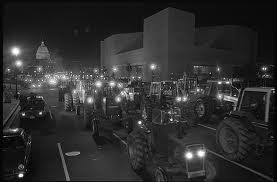
Could this type of nationwide protest happen today? The answer is an unequivocal, "NO," and that somber revelation should make our story an essential part of every high school and college history class. Likewise, the restraint we experienced from the police (with some exceptions) should be taught in every police academy because aggressive police actions can easily hinder a grassroots movement's ability to get the attention of a non-responsive government.
The next photo is indicative. It was taken at the moment AAM "invaded" the USDA headquarters in D.C. and "planted" the AAM flag on top of the building. The lead tractor in the picture was driven by Gerald McCathern of Hereford, Texas. Gerald was AAM's wagon master who authored a book about the movement called Gentle Rebels. Also in the photo are David Samuelson Jr. (facing forward) and Lester Anderson (in profile): two farmers from my home community in Eastern Travis County. Two of AAM's founders from Campo Colorado are also in this photo: Alvin Jenkins who is jumping over the barricade and Gene Schroder wearing the heavy winter cap. The tractor was later donated to the Smithsonian and became part of the AAM exhibit in the Museum of American History. In 2007, it was removed and placed in storage.
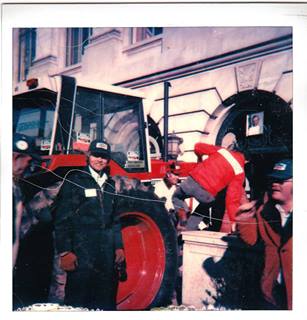
Certainly, the aggressiveness of those engaged in acts of civil disobedience must be tempered, but never terminated by force. Both police and protesters must "get it" and the police must allow protesters to create disturbances of sufficient scope to inconvenience government officials without causing any real harm. Likewise, government officials must be willing to endure inconvenience, embarrassment and even some ridicule along the way, and when it all works, it's a grand moment in the evolution of a democracy.
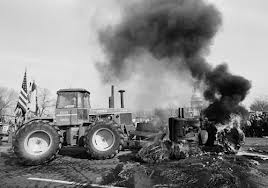
Former Congressman Dan Glickman, who later served as President Clinton's secretary of agriculture, referred to us -- as stated in The Gentle Rebels -- as "The Martin Luther Kings of Agriculture," because we repeatedly committed egregious acts of civil disobedience but we were never violent and we never intentionally caused bodily harm. Admittedly, most assessments of our actions were less complimentary and probably more deserving, excluding some by the national press, which was often brutal and blindly dismissive.
Regardless of how we were perceived at the time, we moved the political system toward more transparency and inclusiveness in numerous ways and the changes we fostered are a source of pride that sustains our bond. Hopefully, when history solidifies our efforts, we will deserve the title of "Gentle Rebels."

Here is the list of our initiatives compiled by Larry...
- a decentralized modern ethanol industry
These efforts consumed millions of dollars, years of effort and required the dedication of thousands of men and women beyond our movement. Sustaining such efforts is a monumental task that's most accurately measured in terms of committed lives and in too many cases, exhausted fortunes.
The pursuit of such changes requires a relentless commitment to causes greater-than-self, and the reward for each small success is the hope that our efforts moved America toward a more perfect union.
Did the contributions of our movement rival that of the labor movement, women's suffrage, the civil rights movement or the Vietnam War protests? The obvious answer is no but in its way, the American Agriculture Movement was equally necessary.
If each of these movements played a necessary roll in the evolutionary progress of our republic, we must ask ourselves if they are even possible under the surveillance of The Homeland Security Agency? Are citizen movements even possible when our government violates our privacy under the cover of law while intimidating the press and indicting whistle blowers? Moreover, is any planned act of mass civil disobedience possible when drones and tasers can be dispatched against American citizens?
We have entered a time in history when a growing percentage of Americans are distrustful and fearful of government. A recent Pew Research poll found that trust in government is near an all-time low.
The people must stand up to any government that institutionalizes the mechanisms to quash civil disobedience through intimidation, coercion and threats of force. Otherwise, the government will blindly prevent the progress that should be harvested from the next grass roots movement of Gentle Rebels.
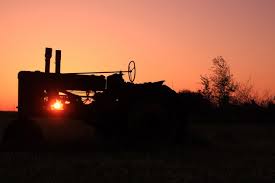
Our thanks to Jo Freeman for her contributions to this article.

